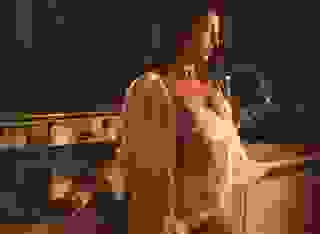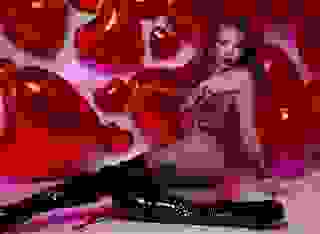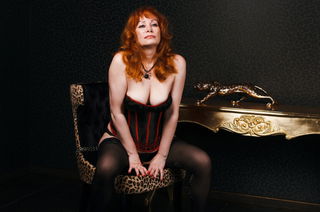Note: You can change font size, font face, and turn on dark mode by clicking the "A" icon tab in the Story Info Box.
You can temporarily switch back to a Classic Literotica® experience during our ongoing public Beta testing. Please consider leaving feedback on issues you experience or suggest improvements.
Click hereWe went into the parlor. I knew right away that something auspicious was coming. The only time we used the parlor was for weddings and funerals. Mother sat me in one of her ghastly carved wood chairs, while she and Julia sat opposite, on her dreadful horsehair sofa. Julia was wringing her hands with anguish.
Mother began without preamble. She said, "We had word that the Gibbs was lost in the hurricane of fifty-seven." I said, "So that explains why the town was surprised to see us."
Mother looked ominous. She said voice dripping disdain, "It was Esau Briggs who brought us the news. He said he heard it in Baltimore City."
Briggs was one of our old social set. His dad was an oil speculator and investor. Briggs junior traveled up and down the coast, buying up options on the proceeds of voyages. I said, "He was almost right. We weathered it out in Ocracoke. But it was a near run thing."
Then it dawned on me. I said, "Did the news cause much distress here?" Mother looked even grimmer, if that was even possible. She said, "Most of us were used to it. We've been through it before. But your bride hadn't."
She added even more ominously, "The news nearly killed Faith. We told her that it was just a rumor, nothing would be certain until you didn't come back. But she just couldn't be consoled."
Mother stopped and looked at me with what almost seemed like pity. Then she continued with fury in her voice, "Esau Briggs devoted all of his time to consoling her."
Julia burst into tears. I was speechless. I said, "Briggs was comforting Faith?" Then it hit me, "NO!! IT COULDN'T BE!!"
Mother said with intense anger, "There is no easy way for me to tell you this, son. But Faith died in childbirth two months ago. It was the disgrace that killed her."
It took a moment. Catastrophic, news is like that. The implications take time to percolate into your brain. Mother saw my face. She hastily added, "Briggs is in France. You'll never find him. Everybody knew you would kill him."
Then she got a harsh look and said, "I don't need to tell you that this is God's judgement. So, accept it" She added in a kindlier tone, "Faith's buried in the Congregational cemetery if you care. We wouldn't allow her to be buried in our churchyard"
It was like being submerged under a breaching whale. The pain was devastating. I couldn't bear it. My little Faith, the love of my life, betraying me with that snake. All light went out of the world. I was a big strapping boatsteerer. But I broke down in tears.
Mother was visibly disgusted by my display of weakness. That was when I understood why Julia was there. She rose, walked over, gently gathered my head to her bosom and we sobbed together. She kept repeating over-and-over, "Faith found out that you were still alive when the Concord pulled in. All she wanted was your forgiveness."
Suddenly, I got the claustrophobic panic that you get when you're drowning. I thrashed my way to my feet and ran panicked out of the house. Both women called out, "Jacob!!"
The rest of the day was a blur. My heart was dead. I remember stumbling down to Faith's grave. I had to confirm it. There was a nice headstone. Her family loved her. It was a hot, cloudless summer afternoon and I just sat on my wife's grave cursing Esau Briggs and the God who would let this happen.
Then I thought about what my mother had said. I was nobody special. So, why was I involving God in the discussion? It was Briggs who owed the bill!! There was only one option. That is, if I ever wanted to be free of the burden of Faith's infidelity. I needed to find Briggs and kill him. It would be my life's purpose.
Hence, with murder on my mind, I went down to the waterfront, drank dark rum in a shadowy corner of a filthy sailors bar and passed out.
*****
I slowly opened my eyes. The gloom and smell was pervasive. I was disoriented. I had a splitting headache and my mouth tasted like the bottom of a blubber vat. I sensed that I was at sea.
I was lying on a floor with a huge man standing over me. It was his boot to my ribs that had awakened me. I jumped to my knees to avoid the next kick. The room spun and I threw up what felt like a gallon of cheap rum. The guy hit me with a roundhouse right. I fell to the floor and he went back to what he had been doing earlier, which was kicking me.
I was more puzzled than hurt. The last thing I remembered was my head hitting the top of the table in an anonymous whaling tavern. Then, the next thing I knew I was getting the shit beaten out of me in what was obviously a ship's focsle.
I hadn't lost a fight in my life and I wasn't going to lose one now. So, I rolled away from the next kick and sprang angrily to my feet. My head hit an overhead beam and I went out like a light. Some fights you lose.
I came around a couple of minutes later. The face that was hovering over me was the ugliest sight imaginable; and I'd looked sperm whales in the eye. He was taller than me, over six-two and he must have weighed close to two eighty.
He was completely bald, with a full beard that looked like a bushy head-of-hair had slipped around to his chin. He had mean, piggy eyes and he was missing an ear, which might have been related to the scar across his face. He had on a ragged captain's swallow-tailed coat and he smelled like the bilge after a long voyage in the tropics.
He gave a nasty laugh and said, "Welcome aboard sailor. I wanted to introduce myself."
I wiped the blood off my mouth and said testily, "Who the hell are you and what the hell am I doing here?" The giant laughed, made an ironic bow and said, "John Quincy Adams at your service... AND you've just joined the triangle trade."
The unpleasant fellow in front of me was clearly not the seventh president of the United States. But I got the joke. John Quincy Adams's nickname was "the Abolitionist" and the triangle trade was still going strong; even though it had been banned in England and America for over a half century.
Cotton and rum went from the U.S. to England, cloth, guns and trinkets went to Africa and slaves were shipped to the U.S. The legal penalty in Great Britain was death. But you could get extremely wealthy if you were successful. Of course, the profit was all for the owners.
Nobody in their right mind wanted to crew a slaver. The only thing a crew member got was regular beatings or hung from a yardarm, if he were caught. It was just my luck that they'd found me passed out; when they were looking for somebody to shanghai.
The captain said, "You're a sailor. What do you do?" I said, "None of your business." Which earned me another rap in the mouth. I said grudgingly, "I was a boatsteerer."
He looked skeptical and said, "You're kind of young to be doing that ain't you?" I said angrily, "I don't give a shit what you think. My wife's dead, and I'm fixin' to join her." Adams got a beatific look on his face, chuckled and said sardonically, "I can help you with that."
That was how I became a maintopman on the good ship Princeton College. It was so-named, because Adams claimed that he had been a student there. He might have been. He was a very smart man. Except he was also creepier than a belfry full of bats.
He could actually quote Latin phrases, or at least I think it was Latin. I barely spoke English. So, foreign tongues were out of my reckoning. But when it came to humanity, he was a total headcase. Adams hated everybody.
The ship I was on was a ninety-foot, square rigged brig of two-hundred-and-seven tons burthen. It had a crew of twenty, which was dangerously sparse for a ship that size. And I was one of the few experienced hands.
Hence, in weather fair or foul, I was the guy who got sent aloft to trim sail on the topgallant yard. That was the most dangerous work on the ship. The pitching of the mast was magnified up there and the deck was a long way down.
*****
I was chained up while we were loading and unloading in Plymouth. It was below-decks where they kept the African cargo. I was bound with another unfortunate. He'd also joined the crew via the abduction method. Except he was a landsman who they'd snatched off a pier on the Chesapeake, while they were loading the tobacco.
The manacles kept us from jumping ship. They had plenty of those handy, given the ship's real purpose. We actually became friends of sort. I suppose it was the brotherhood of misery. We were both literally and figuratively in the same boat.
We talked for hours in the dark of the hold. His name was Springfield and he called himself a preacher, which meant that he had no useful skills. But he could read and carry on a sensible conversation. He'd never had a woman in his life. Being frail and poor, was no way to attract a mate. So, he was very interested in my situation.
I told him about Faith and her betrayal. He said, "But your wife thought you were dead, right? She had no further obligation to the marriage vows if you were dead." That hurt a lot. I wanted Faith's actions to be purposely immoral, not the result of a regrettable misunderstanding.
Springfield asked puzzled, "Do you think that feller made up the story?" I was sure that the slimy son-of-a-bitch had fabricated it. Every young man in New Bedford wanted to slip their hand under Faith's petticoats. But sadly, there was also clear-cut evidence to the contrary, since we HAD nearly foundered.
I don't know whether the fact that Briggs's lie was based on truth made me feel better, or worse. Briggs had always drooled over Faith, just like the rest of the New Bedford lads. She was far and away the most beautiful girl in our social set. I smiled bitterly and said, "No there was truth to it."
I added, "Do you remember that big storm that came up the coast a couple of years ago?" He nodded and said, "Yep, I was lucky that I was spreading the word over in Fredericksburg. Since, it almost blew the Eastern Shore off the map."
I said, "My ship was caught in it. We made it to safe harbor. But a lot of the others didn't."
Springfield said, "So your wife wasn't being THAT unfaithful believing that you'd been lost at sea." I nodded miserably.
I knew Briggs was a snake-in-the-grass. But Faith had always seen the best in people. She would have been an easy mark for his seduction. Especially if she thought I was dead. I would've been lost if the situation was reversed.
I said, "No she wasn't. But she still had no right to let that reptile into her bed."
Springfield said, "Maybe she was just looking for another man. You know how women are. They need a man to take care of them."
That was the common belief back then. But I wasn't so sure that was true with Faith. My wife was very spirited. Still, I DID know that she tended to think with her heart, not her brain. I also knew that she truly loved me, and she would need a lot of comforting. That is, if I was actually dead. Briggs must have used that.
Springfield said, "Whatever the reason you can't blame yourself. A man has to be true to his nature. A sailor has to go to sea. But there was nothing wrong with what your wife did either. She might have mourned you a bit longer. But she DID think she was a widow."
I said angrily, "But I WASN'T DEAD. She just didn't listen to the other women. Faith was always pig headed once she got something in her mind. They all told her to wait." The vision of Faith writhing in passion under that bastard haunted my nightly dreams.
Springfield said, "What did you do to that Briggs fella?"
I said, "Regretfully nothing. His dad squirreled him away in Europe, to keep him out of my reach. Of course, the scandal of him knocking up my wife probably had something to do with his desire to scuttle out of town. I vowed that I would find him some day and settle up the bill."
After that, my reality consisted of two seconds of past and one second of future. That's as far as I could think. Even odder, I was totally devoid of emotion I knew I should feel something. But it was as if, every kind of reaction had been boiled out of me like we cook oil out of a whale.
There was nothing left; not fear, not sadness, not remorse, no sensation whatsoever. I was a hollow man. My soul had shrunk to a husk.
They say that, the opposite of love isn't hate. It's total indifference. That was how I felt about living. It made me appear brave to others. I would do any dangerous thing because I simply didn't care.
******
The voyage to the Guinea Coast and back on the middle passage was pure hell. First, I had to endure the sight of thirty-eight poor souls being herded down to our boats by their own countrymen; to be chained below in the heat of the hold.
I understood that slavery was the underpinning of the southern way of life. And I suppose you have to adopt a cruelly callous mindset if you are going to buy and sell another human. Still, the utter inhumanity was beyond my simple grasp. That is, until I actually witnessed it.
That no doubt sounds naïve. But you have to understand. I was raised in New Bedford, where the only people of color were Indians. I DID know a few black people from whaling. They were among the best harpooners and boat-handlers in the crew; and believe me, skin color isn't a consideration when you're fighting something twice the size of your boat.
That's why the sight of folks, who looked just like my former comrades, being loaded into our hold like animals, just revolted me. A few of the braver souls, myself included, tried to make things a little better for them. We'd smuggle fresh water and food when we could. But we couldn't do anything about the situation except endure along with them.
You might fault me for not doing more. But I was as much a prisoner on that ship as the Africans were. Adams had six guards, all as brutal as he was. They were all armed and any infraction brought the cat. Adams even shot a man for quoting St. Paul about slavery.
*****
It was black as pitch, hot and humid as we slid along the Louisiana coast. I was the helmsman since I was one of the few experienced hands. The heat lightning lit the heavy clouds to the northwest as we passed through the Rigolets strait. It was an ominous portent.
I heard Adams tell his compatriots that we would drop our "cargo," his words, at Mandeville on the north shore of Lake Pontchartrain. I assumed the slave traders would meet us there. That was thirty miles as the crow flies directly across the lake from New Orleans.
New Orleans hosted the biggest slave market in the United States. But since the importation of slaves from west Africa was banned in 1808, we obviously couldn't pull into the docks on the Mississippi side and start unloading. The citizens of New Orleans might have welcomed us. But the authorities would have locked us up.
We were feeling our way in the dark, as we transitioned the straits. This was a delicate time. The navy had armed revenue cutters patrolling Pontchartrain, that were expressly dedicated to catching smugglers. And although the Princeton College was built for speed, it was a sailing brig. There was no way we would outrun a steamship.
We had just gotten past the tip of Treasure Island, into the open lake, when we saw running lights coming out of the Chef Menteur pass and Fort Macomb, to our south east. The only reason for a ship to be out at that time of night was to patrol the lake.
The cutter was headed along the southeast shore. And if we continued on the course that we were on, they would catch us sooner, than later. I wanted Adams to be caught. But we were ALL in deep shit if we were boarded.
We had picked up a pilot at the entrance to the Rigolets. He had rowed all the way over from someplace on the shore of Lake St. Catherine. He was a lanky Frenchified creole with a heavy Cajun accent and he knew more about the neighboring swampland than half the alligators.
He whispered, "Hard apport boy. We can hide in Irish Bayou, yeah." I spun the wheel hard over without consulting Adams. I could see that we were going to have to creep tangentially, out of the course track of the patrol boat.
We would have made it too, except some fool on the foredeck lit a pipe. He must have been nervous, or maybe he wanted us to get caught. It was only a sulfur match. But it flared like a lighthouse in the black of that humid night.
We held our collective breath waiting to find out whether it had been seen. The answer came almost immediately. I heard the clatter of the steam engine increase and the running lights turned in our direction.
We were just passing Irish Point and we could've hidden in the bayou there. But Adams and his guards were in a panic. They hastily put their heads together and came up with a plan to put all of the "contraband" into the ship's whaleboat and then row them back into Bayou Sauvage. He couldn't be hung if there was nothing incriminating on board.
Adams knew I'd pulled the harpoon oar. So, I was the first one he heaved over the side. He also tossed in the creole pilot and Springfield, who was more-or-less useless. Then they sailed away, leaving us to deal with a bayou full of alligators, water moccasins, and all sorts of other venomous whatnot.
We had twenty-eight terrified black people as passengers. There had been thirty-eight to start. But ten had died on the voyage over. That was the usual consequence of being kidnapped out of your life and then crammed into a beastly hot and unsanitary space for days-at-a-time. So, Adams had another think coming if he thought I'd just row those people back for him to sell.
A couple of the captive men spoke French and our Cajun guide eventually got them calmed to a point where we could do some planning. The pilot, Delphin was his name, had the same attitude about slavery that I had. According to him, Bayou Sauvage was full of runaway slave communities. So, he offered to take our passengers back to where they'd never be found.
Hence, I landed twenty-eight refugees and him on a hummock with a trail leading back into the bayou. They could try to rebuild their lives from there. To my amazement, Springfield joined them. He said he saw God's hand in the business, and he wanted to spread the word.
All I saw was darkness and snakes. But I wished them well. The group disappeared into the night, chattering in their odd language. I didn't know what they were saying. But I thought I detected a note of hope in their voices.
********
The sun was coming up over the lake, as I rowed along in the shoreline mists. The area had a humid atmosphere that wasn't like anything I'd encountered in New England. The terrain had changed from swamp to farmland. Yet, there was still no sign of the city of New Orleans.
I was maneuvering along the coast, looking for a logical place to land. I finally encountered what looked like a river leading southwest from the lake. There had to be a city at the end of it.
That waterway was actually a canal. It was something that the French had dug back before Jefferson bought the place, fifty years previous. My whaleboat didn't stand out because there were commercial, barges and other small boats on the waterway, even at that early hour.
I joined the southbound stream rowing easily. There was a turning basin, when I reached the end of the canal. I tied up the boat and made my way down a dusty road. The roadway quickly changed to cobblestones and it had a name, "Canal Street." That seemed appropriate. I had finally reached New Orleans.
I figured I'd put my stake in the ground right where I was at. Since, there was nothing back home but bad memories. I had on the same baggy sailor's pants that I'd been wearing when I was shanghaied. They had a concealed pocket right next to my family jewels. The placement ensures that you're instantly aware of any attempt to get at your valuables.








